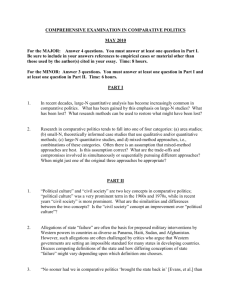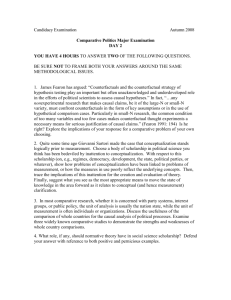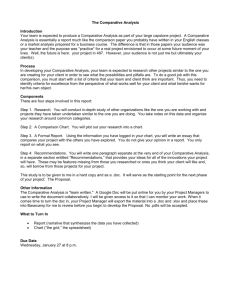August 2013
advertisement
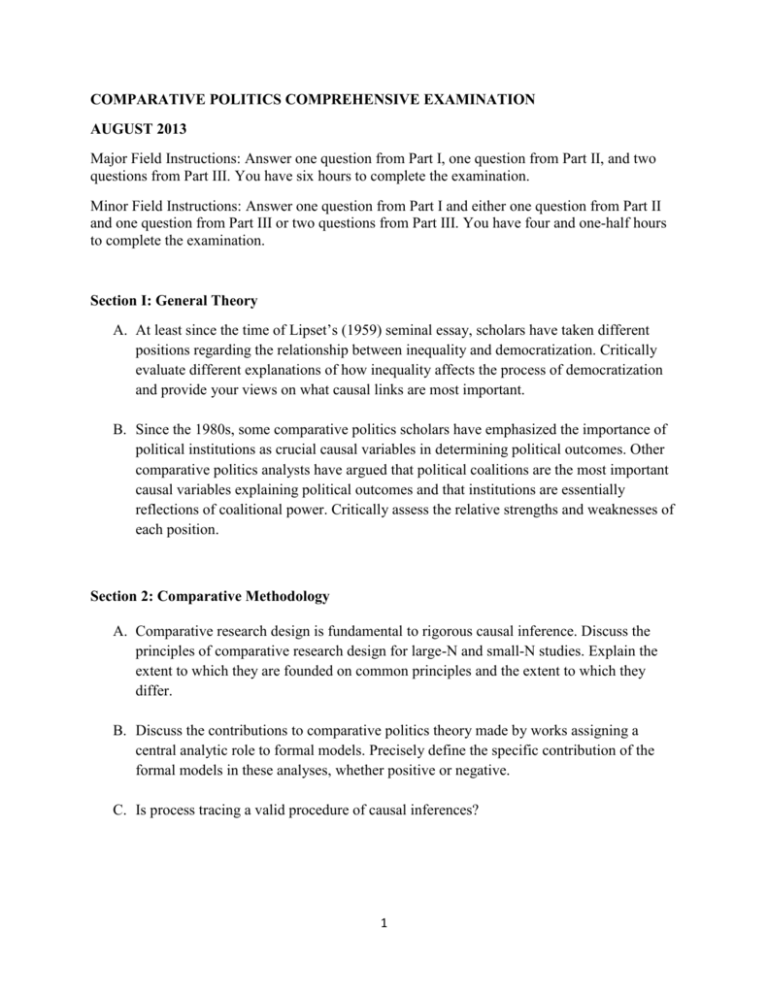
COMPARATIVE POLITICS COMPREHENSIVE EXAMINATION AUGUST 2013 Major Field Instructions: Answer one question from Part I, one question from Part II, and two questions from Part III. You have six hours to complete the examination. Minor Field Instructions: Answer one question from Part I and either one question from Part II and one question from Part III or two questions from Part III. You have four and one-half hours to complete the examination. Section I: General Theory A. At least since the time of Lipset’s (1959) seminal essay, scholars have taken different positions regarding the relationship between inequality and democratization. Critically evaluate different explanations of how inequality affects the process of democratization and provide your views on what causal links are most important. B. Since the 1980s, some comparative politics scholars have emphasized the importance of political institutions as crucial causal variables in determining political outcomes. Other comparative politics analysts have argued that political coalitions are the most important causal variables explaining political outcomes and that institutions are essentially reflections of coalitional power. Critically assess the relative strengths and weaknesses of each position. Section 2: Comparative Methodology A. Comparative research design is fundamental to rigorous causal inference. Discuss the principles of comparative research design for large-N and small-N studies. Explain the extent to which they are founded on common principles and the extent to which they differ. B. Discuss the contributions to comparative politics theory made by works assigning a central analytic role to formal models. Precisely define the specific contribution of the formal models in these analyses, whether positive or negative. C. Is process tracing a valid procedure of causal inferences? 1 Section 3: Applied Theory A. To what extent, if any, is constitutional engineering a solution to the problems confronting new democracies? Discuss with reference to at least two countries. B. Critically analyze the impact of elections on competitive authoritarian regimes. In particular, explain under what circumstances and how elections might reinforce or undermine competitive authoritarian regimes. Discuss in the context of politics in two or more countries. C. Critically assess the contributions and limitations of explanations of ethnic conflict based on a rational choice approach. Support your points with specific empirical examples. D. Is the “great recession” – the combined financial crisis and economic slowdown in the rich OECD countries after 2007 – more a crisis for the welfare state, or a crisis of the welfare state? In your answer, be sure to discuss the institutional and political forces that caused the financial crisis and shaped responses to that crisis. As appropriate, distinguish between various types of welfare states. E. Define the “natural resource curse” and critically discuss its viability as an explanation for the origins and persistence of authoritarian regimes in at least two cases. F. How do electoral systems influence public policy? Outline the logic behind at least one theory connecting electoral systems to public policy outcomes and evaluate the claim by examining evidence from at least two specific countries. 2
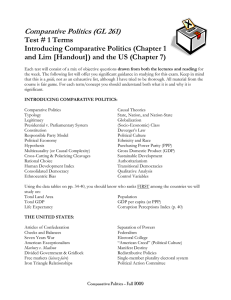


![Comparative Politics (GS 161) Test # 1 Terms and Lim [Handout])](http://s2.studylib.net/store/data/011707684_1-fe811697b4f1a95514b5eff13fe07ae7-300x300.png)


